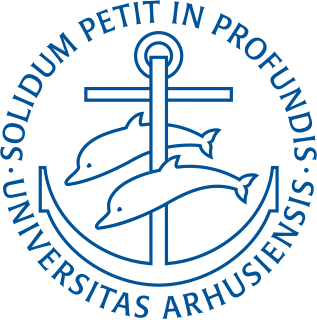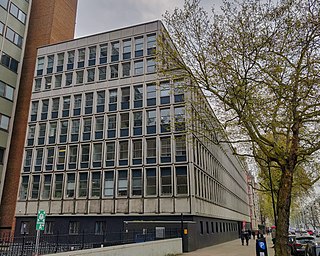Related Research Articles
The history of science and technology (HST) is a field of history which examines how understanding of the natural world (science) and ability to manipulate it (technology) have changed over the centuries. This academic discipline also studies the cultural, economic, and political impacts of scientific innovation.

Imperial College London is a public research university located in London. In 1851, Prince Albert built his vision of an area for culture, including the Victoria and Albert Museum, Natural History Museum, Royal Colleges, Royal Albert Hall, and the Imperial Institute. In 1907, Imperial College was established by royal charter, merging the Royal College of Science, Royal School of Mines, and City and Guilds of London Institute. In 1988, the Imperial College School of Medicine was formed by combining with St Mary's Hospital Medical School. In 2004, Queen Elizabeth II opened the Imperial College Business School.

Aarhus University is the largest and second oldest research university in Denmark. The University is ranked among the top 100 world's best universities, belongs to the Coimbra Group, the Guild, and Utrecht Network of European universities and is a member of the European University Association.

The UCL School of Pharmacy is the pharmacy school of University College London (UCL). The School forms part of UCL's Faculty of Life Sciences and is located in London, United Kingdom.

Banaras Hindu University, formerly Central Hindu College, is a public central university located in Varanasi, Uttar Pradesh. It was established in 1916 by Madan Mohan Malaviya, with co-operation from Annie Besant. With over 30,000 students residing in campus, it is the largest residential university in Asia.

Cochin University of Science and Technology (CUSAT) is a government-owned autonomous science and technology university in Kochi, Kerala, India. It was founded in 1971 and has three campuses: two in Kochi, and one in Kuttanad, Alappuzha, 66 km (41 mi) inland. The university awards degrees in engineering and science at the undergraduate, postgraduate and doctoral levels.In the 2016-17 Times Higher Education World University Rankings, CUSAT is the only institution in Kerala,is one among the 31 institutions in the country to be ranked in the global survey.
Translational medicine is defined by the European Society for Translational Medicine (EUSTM) as "an interdisciplinary branch of the biomedical field supported by three main pillars: benchside, bedside, and community". The goal of TM is to combine disciplines, resources, expertise, and techniques within these pillars to promote enhancements in prevention, diagnosis, and therapies. Accordingly, translational medicine is a highly interdisciplinary field, the primary goal of which is to coalesce assets of various natures within the individual pillars in order to improve the global healthcare system significantly.
The UCL Mullard Space Science Laboratory (MSSL) is the United Kingdom's largest university space research group. MSSL is part of the Department of Space and Climate Physics at University College London, one of the first universities in the world to conduct space research. Since its establishment, MSSL has participated in 35 satellite missions, 10 of which are currently in operation, and in over 200 sounding rocket experiments.

The University of Agriculture (UAF) is a public research university in Faisalabad, Pakistan. It is ranked 4th in Pakistan and 1st in the field of Agriculture and Veterinary Sciences by Higher Education Commission (Pakistan) (HEC) Ranking in 2019. It was also ranked at No.127 in life Science and Agricultur Science. The employability ranking by Pakistan made this institution highly reputable. The university came among top 5 institutions of Pakistan in research power. Muhammad Ashraf is serving as Vice Chancellor of the University.
The UCL Department of Science and Technology Studies (STS) is an academic department in University College London, London, England. It is part of UCL's Faculty of Mathematics and Physical Sciences. The department offers academic training at both undergraduate and graduate levels.

John Pickstone was a British historian of science and the Wellcome Research Professor in the Centre for the History of science, Technology and Medicine, in the Faculty of Life Sciences of the University of Manchester.

Sokoine University of Agriculture (SUA) is a public university in Morogoro, Tanzania, specializing in agriculture. The university is named after the country's second prime minister Edward Sokoine.
The UCL Centre for the History of Medicine (UCLCHM) was an academic research and teaching centre for the history of medicine at University College London (UCL) in London. It succeeded the Wellcome Trust Centre for the History of Medicine at UCL. The UCLCHM was founded in 2011, and from September 2011, it took over some of the former staff of the Wellcome Trust Centre at UCL, including four emeritus academic staff, six teaching staff, and associated staff in a number of other UCL departments.

Thais Russomano is a Brazilian doctor and scientific researcher specialising in space medicine, space physiology, biomedical engineering, telemedicine and telehealth. She founded the Microgravity Centre (MicroG) at PUCRS university, Porto Alegre, Brazil, in 1999, coordinating it for 18 years until 2017. The MicroG is the first educational and research centre in Space Life Sciences in Latin America. She is a senior lecturer at King's College London, lecturing in Aviation and Space related courses; coordinator of the Space Network, University of Lisbon; guest lecturer at Aalto University, Finland in Space and Design; guest lecturer at Pfarrkirchen Institute of Technology, European Campus, contributing to the MSc in Medical Informatics; consultant for the Skolkovo Foundation; member of the Mars One Advisory Board; International Relations Director for the UK-based HuSCO, Human Spaceflight Capitalization Office; and director of two private companies linked to space life sciences and telehealth – InnovaSpace Consultancy (UK) and International Space Medicine Consortium (USA).
The Centre for the History of Science, Technology and Medicine (CHoSTM) is an academic department of King's College London which teaches and researches the History of Science.

The Centre for Environmental Policy is a department at Imperial College London in the Faculty of Natural Sciences. Its aim is to influence a wide range of environmental issues through research on the environmental, energy and health aspects of global problems. CEP's current Director is Professor Mark Burgman.
Ignatius Ajuru University of Education is a Nigerian university based in Rumuolumeni Port Harcourt, Rivers State. The first Vice-Chancellor of the university in 2014 was Rosemund Dienye Green-Osahogulu. The present Vice-Chancellor is Ozo-Mekuri Ndimele.

The Department of Computing (DoC) is the computer science department at Imperial College London. The department has around 50 academic staff and 900 students, with around 500 studying undergraduate courses, 180 PhD students, and 150 MSc students. The department is predominantly based in the Huxley Building, 180 Queen's Gate, which it shares with the Maths department, however also has space in the William Penney Laboratory and in the Aeronautics and Chemical Engineering Extension. The department ranks 7th in the Times Higher Education 2020 subject world rankings.

The Department of Mechanical Engineering is responsible for teaching and research in mechanical engineering at Imperial College London, occupying the City & Guilds Building at the South Kensington campus. The department has around 45 faculty members, 600 undergraduates, and 250 postgraduate students. The department ranks 8th in the QS World University Rankings's 2018 table.

The history of Imperial College London can be traced back to the founding of the Royal College of Chemistry in 1845 in London, with some ancestral medical schools dating back to 1823. The college was formed in 1907 out of the Royal Colleges in South Kensington, and throughout the 20th century became central to the national strategy for technical education and research. It existed for most of its life as part of the University of London, only becoming independent in 2007.
References
- ↑ http://www.londoncentre-hstm.ac.uk/ Changes to the program.